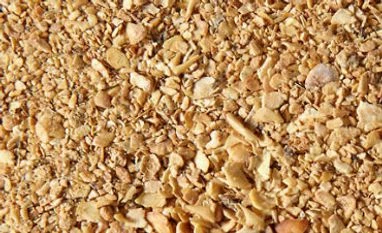Oilmeal export fell 61 per cent in the period between April and June, first three months of this financial year.
Data from the apex industry body, the Solvent Extractors’ Association of India, showed export at 186,293 tonnes in the first quarter, from 473,676 tonnes in the same period of last year. Last month, the fall was 48 per cent, at 88,514 tonnes, as compared to 169,699 tonnes in the same month last year.
South Korea continued to remain top oilmeal importer from India, at 123,977 tonnes in the quarter, as against 305,849 tonnes in the same period last year. With 40,036 tonnes, Vietnam was next, as compared to 88,172 tonnes earlier.
“In India, cost of production is very high due to extremely high seed prices. A $30 a tonne difference between local and overseas price makes a huge difference for importers and they have gradually shifted,” said a senior industry official.
To encourage farmers, the government has been encouraging raising the minimum support price every year but this has made oilseed prices much higher, said the official.
Data from the apex industry body, the Solvent Extractors’ Association of India, showed export at 186,293 tonnes in the first quarter, from 473,676 tonnes in the same period of last year. Last month, the fall was 48 per cent, at 88,514 tonnes, as compared to 169,699 tonnes in the same month last year.
South Korea continued to remain top oilmeal importer from India, at 123,977 tonnes in the quarter, as against 305,849 tonnes in the same period last year. With 40,036 tonnes, Vietnam was next, as compared to 88,172 tonnes earlier.
Also Read
The major reason for India losing ground in the global market is a higher price quote. Compared to $495 a tonne (FOB), soybean meal in the benchmark Rotterdam market was quoted at $465 (CIF). Rapeseed meal at $245 a tonne in global markets is quoted by Indian exporters at $290 a tonne.
“In India, cost of production is very high due to extremely high seed prices. A $30 a tonne difference between local and overseas price makes a huge difference for importers and they have gradually shifted,” said a senior industry official.
To encourage farmers, the government has been encouraging raising the minimum support price every year but this has made oilseed prices much higher, said the official.
)